I had been feeling a little apprehensive about the community interviews that we were soon due to conduct. There was no doubt in my mind that everyone we spoke to would make us feel welcome, but I wanted to give them reason to like us, not merely tolerate our presence out of politeness. As it turned out, I needn’t have worried at all. If there’s one thing that’s guaranteed to break the ice, it’s a proper Maasai wedding.
A few days earlier, Vincent had mentioned in passing that a friend of his was getting married on Saturday, and that we were welcome to come if we wanted to. We leapt at the opportunity, but as the days passed we began to wonder how serious he had really been. To us, the idea of inviting virtual strangers to your wedding seemed a little mad, but we weren’t complaining. Then the big day arrived, and we were informed once again that we were of course very welcome to attend. Unable to believe our luck, we neatened ourselves up for the occasion and piled into the jeep, rehearsing our congratulations in broken Swahili.
As well as Mandela, we were accompanied by a local Maasai man, Solomon. We were grateful for his presence, hoping that he could warn us against making any major social blunders and perhaps even help us make a few friends. He led us around for some introductions as we did our best to take in the sudden explosion of things to see, smell and hear. It quickly became apparent that this was to be an open-air wedding, with several sizeable marquees and a small army of plastic chairs dotted around the homestead. The savoury scent of nyama choma (barbequed meat, something of a Kenyan specialty) permeated the air, as the guests tucked in and exchanged warm greetings.
We took our seats and sipped our sodas nervously, hoping nobody challenged our presence. Though all seemed well, we still weren’t quite sure how we had wound up here – Vincent was nowhere to be seen, and we knew we stood out rather a lot. Even with Solomon’s help, it seemed we weren’t exactly a hit yet.
“Do you know Mombasa county?” he asked, out of the blue. We nodded – as the second biggest city in Kenya, Mombasa was a familiar name. Solomon nodded towards a well-dressed man sitting a few seats away from us. “That’s the governor.”
We caught his attention, and greeted him with a flurry of awkward waves.
“Mzungu,” he chuckled. There wasn’t much we could add to that, and the conversation sputtered to a halt.
Undeterred, Solomon led us off to meet the Maasai elders. They were a short distance away from the site of the wedding itself, sitting under a tree in the middle of a grassy field. Next to them was a sizeable fire where some equally sizeable hunks of meat were cooking. These men looked as though they would happily enter into a staring contest with a lion, and win. Their faces were craggy and characterful, their expressions utterly inscrutable. They also didn’t seem to speak a word of English, so after introducing ourselves we were left with little to do other than smile foolishly and hope that Solomon was saying something nice about us.
Whatever he said seemed to do the trick, because we were then invited to stand by the fire and sample some meat. At this point, being a group with four vegetarians, we hit something of a roadblock. Luckily, Caterina had no qualms, and bravely tucked into a hefty slice which had been sheared off with an actual sword. She reported that it was quite tough on the jaws and blisteringly hot, but the flavour was good. I had never been so grateful to see someone else eating meat, and felt as though we had narrowly dodged a bullet of social embarrassment. The Maasai elders seemed not to mind either way, and we were offered another chance to get involved: a concoction of herbs was brewing away in a metal pot, which we were informed had potent medicinal properties. Solomon poured me a cup, and I looked down at the dark red liquid suspiciously, trying to figure out how many sips I could get away with before making my excuses. To my immense surprise, the flavour was close to that of a mild green tea, and I cheerfully downed the lot.
With a belly full of Maasai medicine, I felt ready to throw myself into this wedding wholeheartedly, which was just as well – the music had started, and things were about to get underway. We hurried back to the marquees and settled into our seats, trying and failing to look inconspicuous. Then, in a sudden burst of noise and colour, the bride and groom arrived. She wore a beautiful white dress accentuated with traditional Maasai jewellery, and he looked exceptionally sharp in a dark blue suit and purple tie. Amidst the gaggle of friends and family standing with them, we finally spotted Vincent, who flashed us a winning smile as they paraded past.
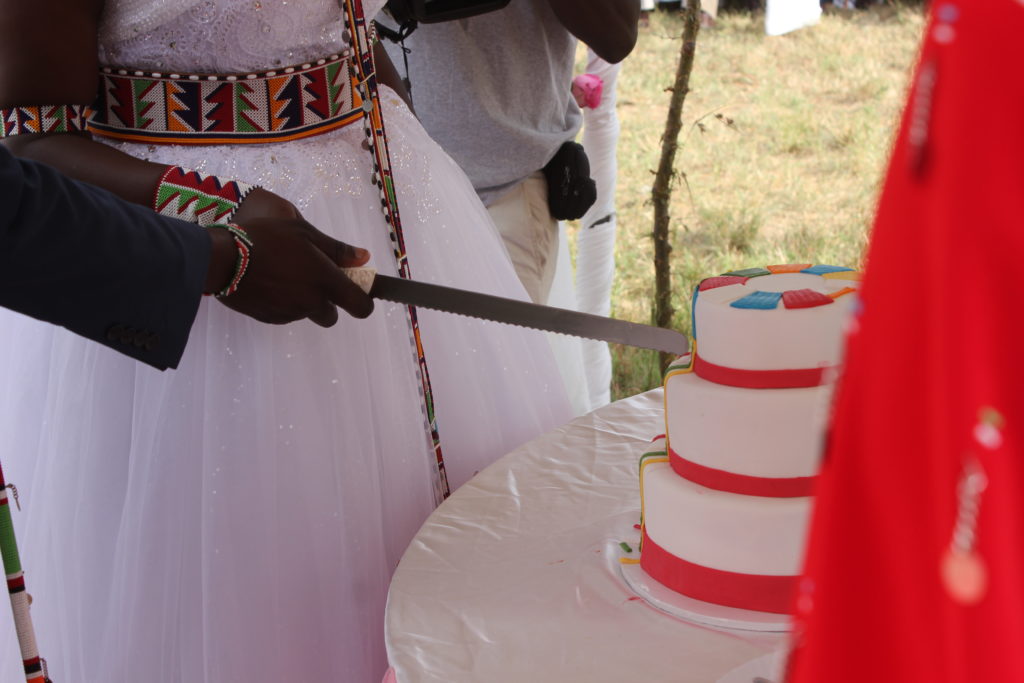
Judging from the reactions, the multitude of speeches were excellent, but our limited linguistic capabilities meant we could do little more than smile and clap when everyone else did. At last, they switched to a language that we were all at least passingly familiar with – dancing. The proceedings were led by a girl who looked to be around our age, and a quartet of morans (Maasai warriors), all dressed in traditional garb. They danced with palpable enthusiasm, grinning at their audience as they lip-synced flawlessly with the music pulsing from the speakers. One by one, guests started to get up and join in, forming a series of concentric circles around the main dancers.
Maasai dancing is a peculiar, entrancing combination of bobbing your body up and down while pushing your head back and forth in a motion that is vaguely reminiscent of a pigeon but far more rhythmic. It appears simple, but the timing is surprisingly difficult, and it doesn’t look at all as good unless your neck is loaded with Maasai jewellery that bounces in unison with the rest of your body. From time to time, the warriors would leap into the air as though they were spring-loaded, reaching dizzying heights with apparent ease. As the dancing commenced, I dashed off quickly to use the bathroom, but I noticed the others boldly making a move towards the dancefloor. What were they planning?
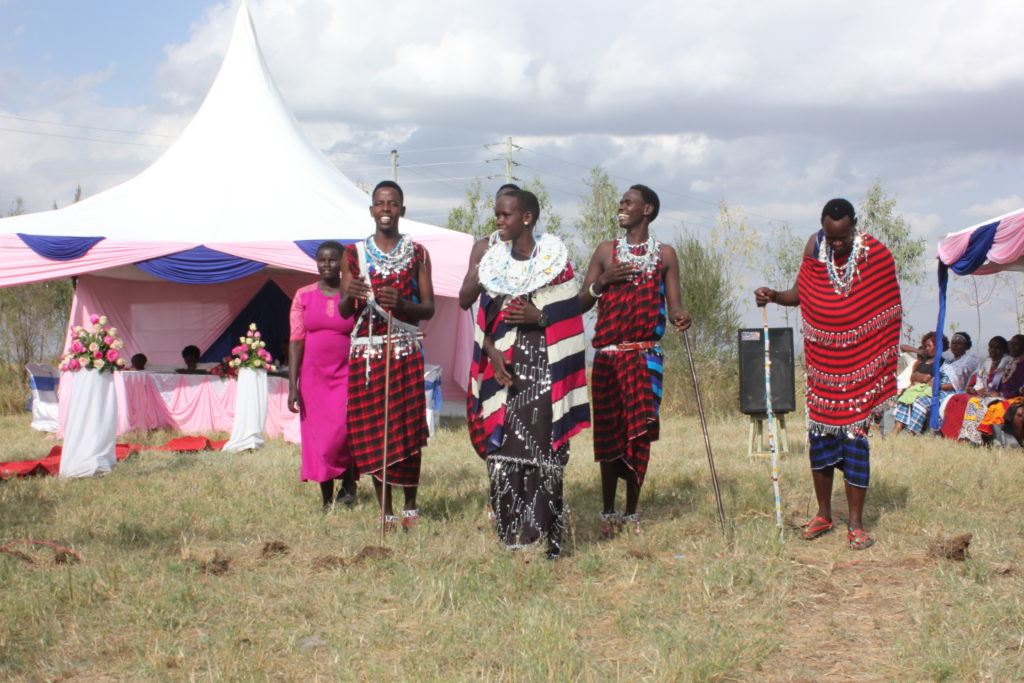
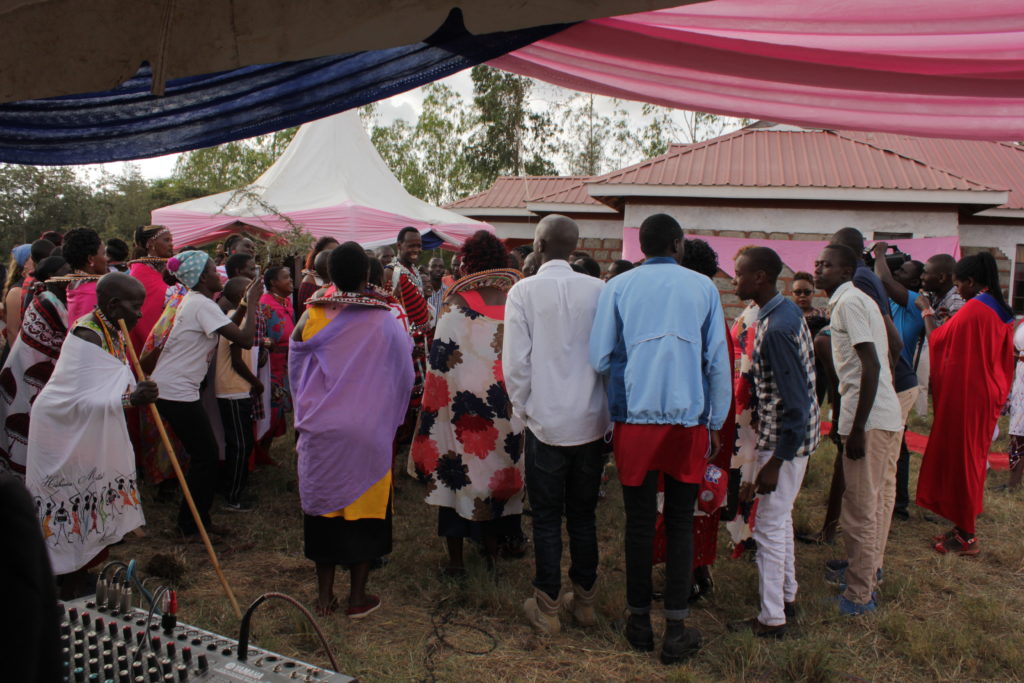
When I returned, a mere two minutes later, I found them at the front of a procession that seemed to consist of half the wedding guests and was winding its way through the grass with joyous abandon. Heads bobbing, grinning manically, they looked utterly in their element, and everyone else was loving it. At last, it seemed, we had successfully infiltrated a Maasai wedding.
Once the dancing started, it looked as though it would never stop. We hurled ourselves into it with a newfound surge of energy, twisting and leaping like three-legged gazelles. Well, perhaps I should only speak for myself – some members of our group were a touch more rhythmic than others, but we were certainly equal in our enthusiasm. Things got even better when the horde of children in attendance overcame their shyness and started to take an interest in us. Soon we could barely fend them off, as the kids flocked around us and bombarded us with hugs, high fives and flower petals.
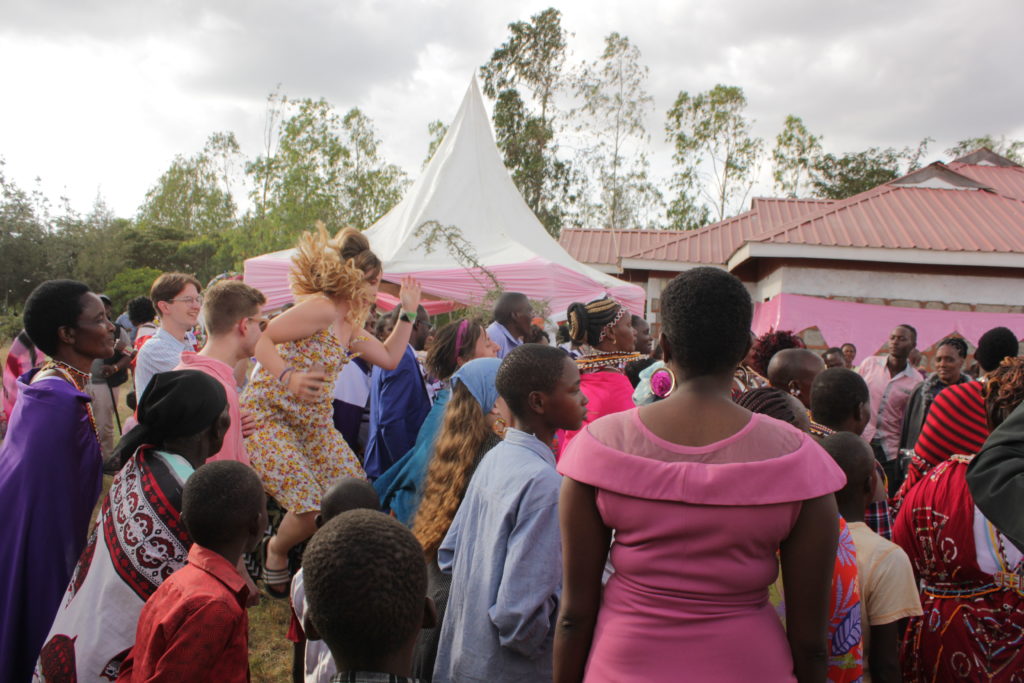
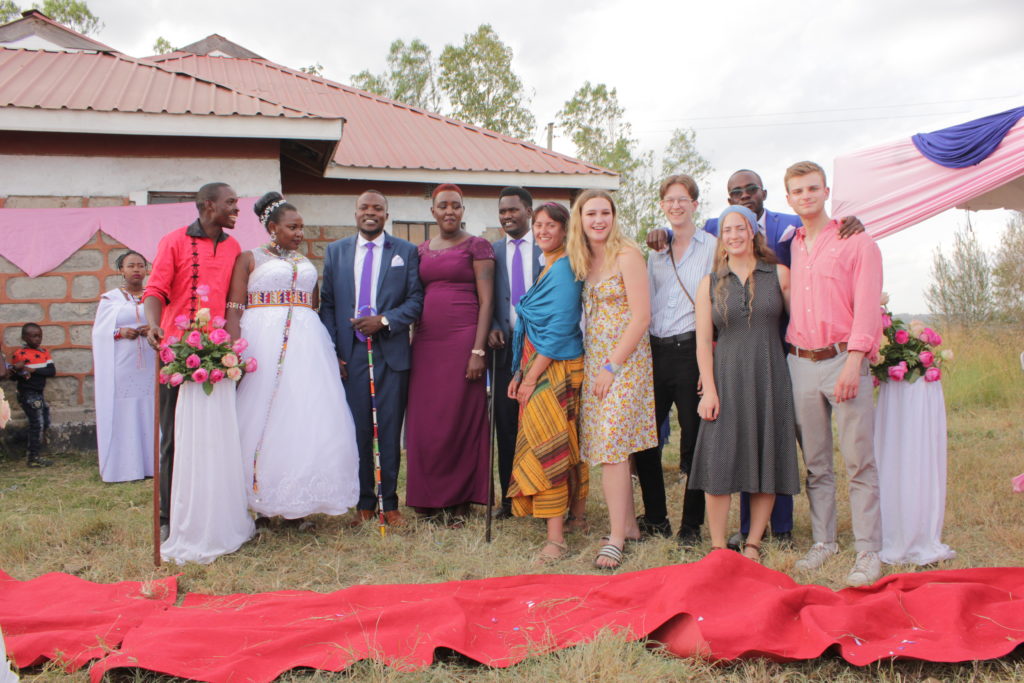
The rest of the wedding occupies a happy, blurry place in my memory. By the end, I had danced so much that I thought my knees might give way, and my face ached from grinning. We congratulated the bride and groom, thanking them for letting us be a part of such a special day and apologising for momentarily stealing the spotlight. Fortunately they seemed not to mind, and I optimistically thought to myself that we might have even helped a little by keeping all the children busy. The aforementioned children were the most boisterous and playful I have ever met, with an insatiable appetite for new dance moves (sated only momentarily when Caterina taught them the macarena) and a constant demand for selfies which we gladly supplied.
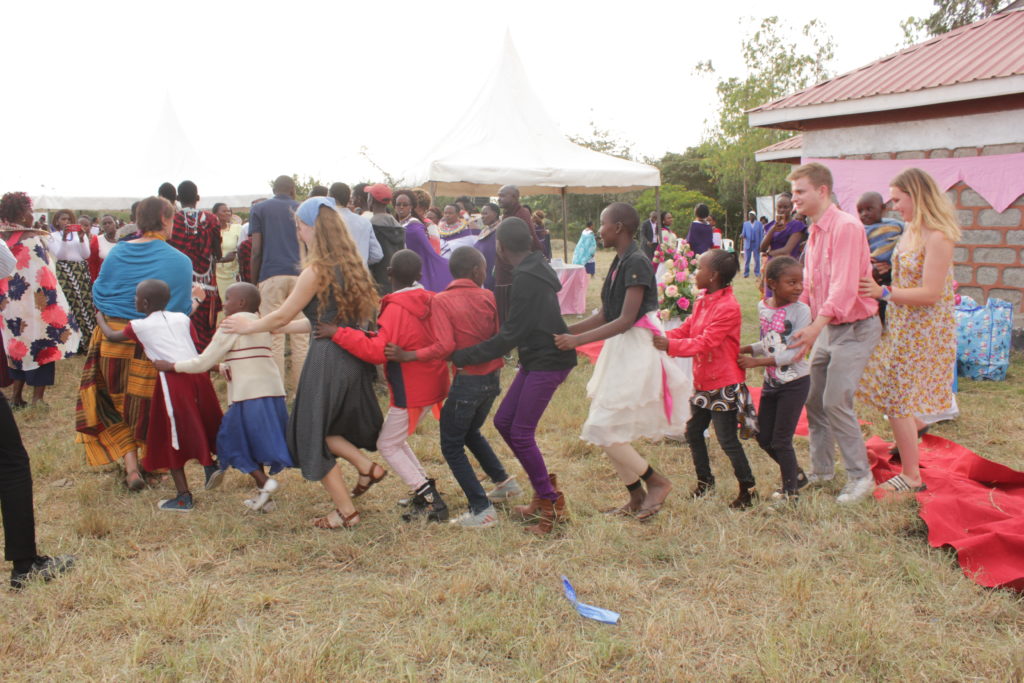
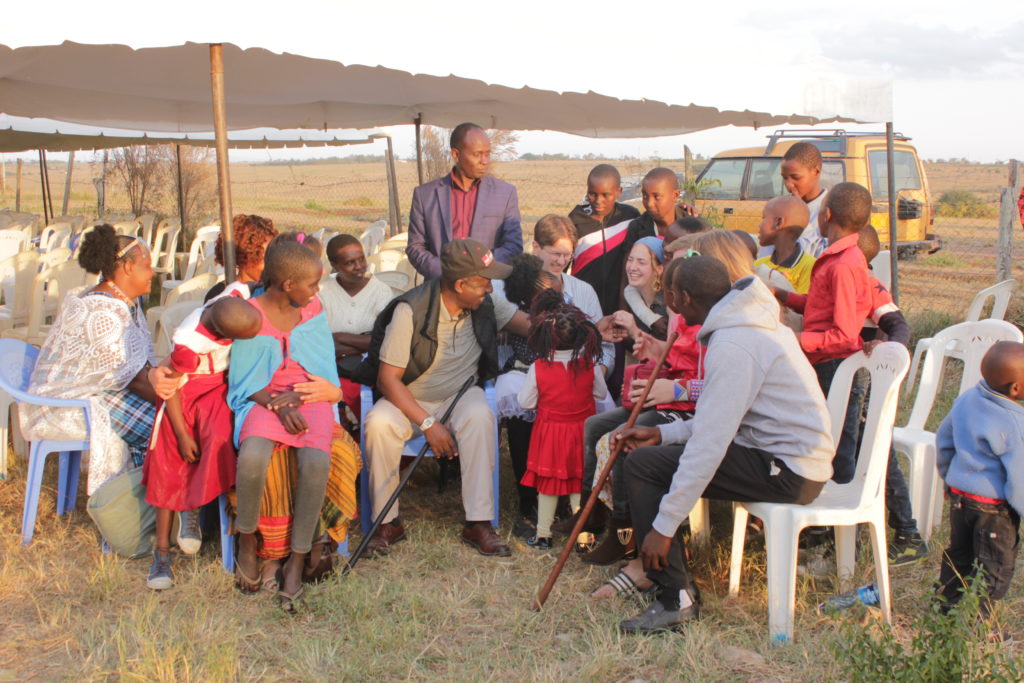
We left the wedding with a wonderful feeling of genuine warmth and acceptance. Our determined efforts not to embarrass ourselves had failed magnificently, and I think it was precisely for this reason that the other wedding guests seemed so happy to have us around. Energised by this brief, brilliant taste of Maasai culture, I was excited to learn more, and I found that my nervousness about the interviews had all but dissolved. After all, once you’ve danced with someone, what’s a few questions?
